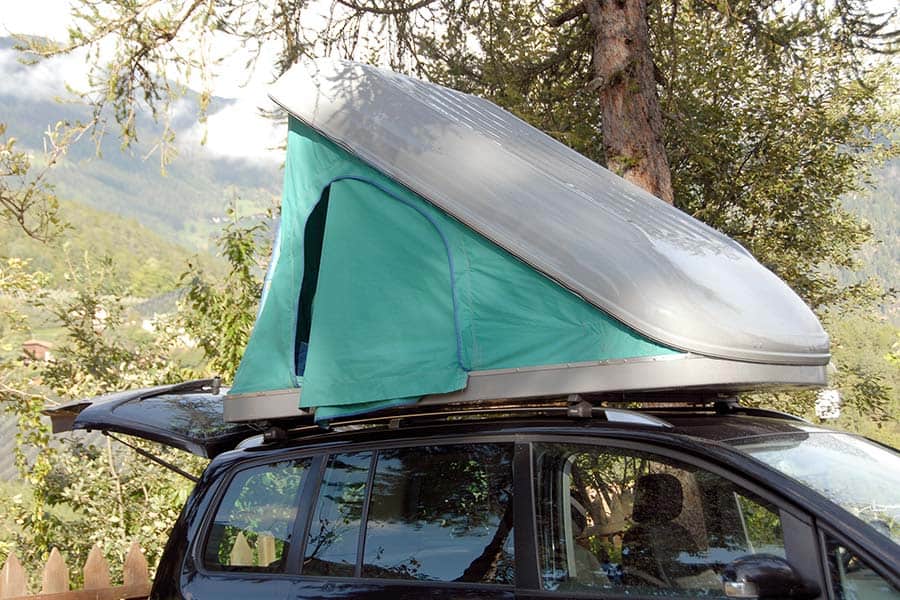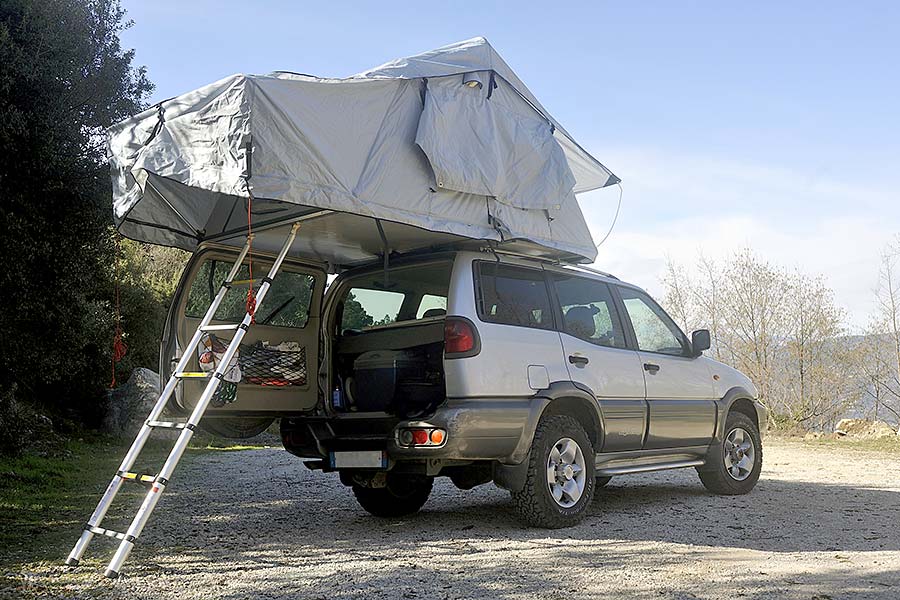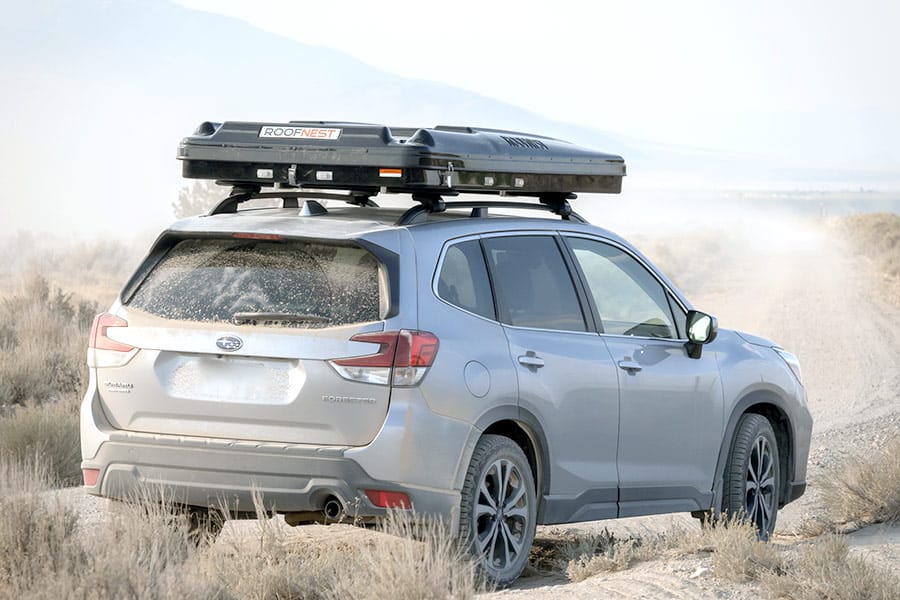
Rooftop tents are a kind of tent designed to be mounted onto the roof rack of a motor vehicle like a car, truck, or SUV. Usually, they consist of a platform made from marine plywood or similar materials that has a tent mounted to it. So what are the advantages of a rooftop tent?
Rooftop tents are more secure than ground-based tents and less expensive than RVs and campers. Additional advantages, they are spacious, comfy, and safe: the elevation of a rooftop tent keeps creepy-crawlies away and feels safer than sleeping on the ground. Not only that: they are super cool.
But what else is there for you to know about these unique camping shelters? Are they easy to set up? What other benefits might they offer the discerning camper? Continue reading to find out why you should consider a rooftop tent.
Advantages of a Rooftop Tent
Rooftop tents are a fun and unique way to camp. While some may prefer hammocks, traditional tents, RVs, or even a hotel room, there are definite advantages to camping in a rooftop tent. Generally made of a pop-up tent ‘shell’ that is affixed to a base and mounted to roof racks, rooftop tents are made from a variety of tent materials and with dozens of different options available, depending on your needs.
So, why would you choose a rooftop tent over a traditional tent pitched on the ground? The primary reason to choose a rooftop tent over a ground-based tent is elevation. Many camping pests like mice, spiders, ants, snakes, or other creepy crawlies are highly unlikely to find their way into your rooftop tent. You don’t need to worry about water or other ground-based hazards. Many find camping on the roof of a car provides a feeling of safety that ground camping does not.
For those of us who follow the hot trends, the #vanlife has become vogue again. People of all ages are discovering the joy of taking an old van and turning it into a house on wheels to experience life in a whole different way. Of course, the #vanlife also comes with some expensive van stuff and the costs of conversion.
Rooftop tents are far more economical than a traditional conversion van, but they’re just as rugged: you can camp on the beach, in the woods, at the lake, wherever your car or truck can go. They can also be mounted on nearly any vehicle. Of course, if you have a truck or an SUV already, you can manage a bigger tent, but even those driving Fiat 500’s can find a tent that fits.
To know if it is feasible to put a rooftop tent on your vehicle, consult the owner’s manual for your specific brand and model of vehicle to see what the manufacturer allows for roof weight. Don’t forget when figuring out the weight your roof can hold to account for the weight of the roof rack, tent, and how much the occupants will weigh in total.
But doesn’t it seem difficult to put up a tent while you’re trying to balance on top of a car? Most rooftop tents feature a mechanical device to help you pop up the tent. Some use spring mechanisms like you might see on a truck cap; other mechanisms include hand cranks or folding walls. You won’t be fiddling around with threading tent poles – modern rooftop tents are pretty easy to set up. You won’t need to worry about a tent pad or a footprint, either.
One of our favorite rooftop tent setup mechanics is in the King Camp rooftop tent. This tent mounts to your roof rack like a little pod, with a waterproof hard-shell top that protects your tent. Then, when you’re ready to camp, you just undo the straps, give the roof a nudge, and watch it expand. Aluminum alloy supports, provide strength and flexibility while keeping the weight down to a manageable 116 pounds. In addition, the tent features an easily deployed shade awning, a folding ladder for access, and a soft foam sleeping pad that covers the tent’s floor.
Why would you choose a rooftop tent instead of an RV or camper van? In a word: cost. Not everybody has the surplus income to be able to afford an RV or a camper, or even a pop-up. But most anybody with a car and an extra thousand bucks can get into rooftop tents.
Not that thousands of dollars is cheap, but it’s much less than an RV. And for your money, you can get a decent-quality, comfortable, and safe rooftop tent that attaches to almost any car. One of the best rooftop tents for those who don’t want to spend a lot of money is the Smittybuilt Overlander. Selling for just over $1,000, the Overlander has excellent features like an LED light strip, a comfortable mattress, and high-quality canvas material that will withstand heavy use.
Another excellent option for rooftop tent campers who don’t want to break the bank is the Front Runner. The Front Runner is made from a special Oxford tent fabric and sets up with one motion, which couldn’t get any simpler. The Front Runner can be set up on most vehicles over either side or the rear. And you can get great views through the mesh windows of the tent. For comfort, the aluminum base is insulated, and it comes with a mattress. It is really light, weighing in at only 93 pounds, and has a low profile. This beauty will set you back at less than $1,500.
Not only are they cheaper, but rooftop tents offer a more ‘pure’ camping experience vs. RVing. RVing is great, of course – but for some, the conveniences and niceties of an RV might detract from the rugged feeling of camping. Roof top tents are a step up from traditional tents, but you’d be hard-pressed to find one that had a TV or a kitchenette in it.
A similar argument can be made to compare a rooftop tent with a hotel. Don’t get us wrong – hotels and motels offer comfy beds, entertainment, safety, access to running water, and food. Many offer swimming pools and gymnasiums. Much like RVing, it’s hard to say that staying in the Motel 6 is roughing it. But for many, camping is about getting away from the trappings of modern life and getting off the beaten path. A rooftop tent offers that experience in a way no hotel can.
However, your average hotel is not likely to have problems with critters like bears. Cute and cuddly as they look, bears are very strong, quite cunning, and in certain situations, dangerous to humans. Will a rooftop tent keep you safe from one of these adorable creatures? Bears can get into and ruin a vehicle’s interior, so no, in a one-on-one fight, your rooftop tent is not likely to defeat a bear.
However, that can be said of traditional tents and even RVs. Bears are strong, curious, determined, and clever. Therefore, rooftop tent campers should follow the same steps to minimize their risk as any camper: store food safely, either in a bear bag in a tree or in a bear can. Don’t leave any food in your tent or on your person. And maybe keep some bear spray in the tent with you. These basic common sense measures will keep rooftop campers safe in bear country.
Other Posts of Interest
- Are Camping Fridges Worth It? These Ones Are!
- Camping With Blankets Instead Of Sleeping Bags: Here’s How
- How To Pack A 4×4 For Camping: A Comprehensive Guide
- 11 Unforgettable Places To Van Camp In Southern California

How Comfortable is a Rooftop Tent?
In general, we’d rate rooftop tents as being more comfortable than regular, ground-pitched tents, but less comfortable than an RV or fifth wheel. But, of course, most campers are curious and industrious folk, and chances are good you can find ways to improve upon the overall comfort of your tent.
Camping on the roof of your car probably doesn’t sound very comfortable. Vehicles are made of metal, and roofs are usually curved, often with aerodynamic bumps or lines. However, rooftop tents are not literally pitched on the roof of a car: they’re pitched on platforms that mount to roof racks.
Ok, so sleeping on a platform also doesn’t sound super comfortable. Knowing this, almost every rooftop tent manufacturer we’ve seen on the market has included a mattress in their tent design. Some include thick foam mattresses to rest on after a day’s hiking and fishing; others include fancy moisture-wicking systems to keep campers dry even on the dewiest of mornings.
What about stuffiness? Will your tent get hot and stale? If you’re camping in a hot place like the Everglades or Death Valley, chances are your tent is going to be hot. However, rooftop tent manufacturers take advantage of the elevation of their platforms and design in windows, vents, and awnings to encourage airflow in your tent. In terms of temperature, you’re at the mercy of the local climate, but these tents are almost all very well ventilated.
So rooftop tents usually have comfy padding and good ventilation. How about headroom? Headroom varies from tent to tent and design to design. In general, rooftop tents do not have room for adults to stand fully erect. However, many tents have enough room for people to sit upright and lounge about.
We will say that if you need an early-morning trip to the restroom, climbing down the ladder to head for the trees in the dark might take a bit of getting used to.
How Long do Rooftop Tents Last?
Rooftop tents, properly cared for, can last for many years. Specific information varies depending on your particular model and your usage patterns. That said, many users have reported that their tents hold up well even during overland journeys and long camping. For tents that spend a lot of time outside and not in storage, the sun cover will likely get a little bleached over time.
Do You Need a Roof Rack for a Rooftop Tent?
If you want to get a rooftop tent, you need a roof rack. The specific requirements for your roof rack vary depending on what specific rooftop tent you’re using to camp. For example, heavy-duty rooftop tents might require specific mounting hardware, while smaller tents might be compatible with more types of racks.
Some brands of rooftop tents are actually owned by roof rack makers: Thule makes tents that are designed to mount on their popular roof racks.
How Much do Rooftop Tents Weigh?
As a general rule, the weight range for rooftop tents runs from about 80 pounds to about 200 pounds. Roof top tents come in a wide variety of shapes and sizes. They also come in many materials: some have heavier metal frames, solid plastic or hardened canvas tops, thicker mattresses, or just more material.
How much the tent weighs is a different question from how much weight they can support. A two-person rooftop tent generally can hold about 400-600 pounds, depending on your specific model. For average hikers and campers, this should be sufficient.

Are Rooftop Tents Bad for Your Vehicle?
Properly mounted rooftop tents are not bad for your vehicle in and of themselves. Roof racks are designed to carry cargo, and rooftop tent makers have every incentive to develop their products not to damage vehicles.
However, carrying a rooftop tent on your car will affect the balance and handling of your vehicle.
Because they are relatively heavy and mounted atop your car, rooftop tents will raise the center of gravity of your vehicle. Unfortunately, the extra weight and mass will also affect your vehicle’s fuel economy and increase drag. So while a rooftop tent is excellent for camping expeditions, you probably don’t want to leave it mounted on your roof 24/7 unless you are camping regularly.
Should a Rooftop Tent be Removed When Not in Use?
Whether to remove your rooftop tent when not in use is largely a matter of personal preference. As I previously mentioned, rooftop tents will affect your vehicle’s performance. That said, rooftop tents do not necessarily have to come off of your car between sorties into the woods: you can leave them on for extended periods.
Indeed, many rooftop tents are mounted onto your roof racks with a complex series of nuts and bolts that offer stability, but also make rooftop tents challenging to dismount. Tents are also heavy: it’s not easy to lift a 100-pound tent off a roof rack by yourself.
Some owners leave their tents on full-time while others undertake the mounting and dismounting of their tents when they go from camping to regular life. A few owners build cranks and hoists to help them mount and remove their tents.
How Do You Store a Rooftop Tent? (and protect it from critters)
If you do decide to remove your rooftop tent, how do you store it? First, you need enough spare space to stash your tent. Garages are an ideal location, though some may end up storing their rooftop tents in a storage unit. Second, you need to find a way to keep your tent dry and safe from insects and rodents.
One method is to lean your tent against a wall. You can build a small cradle with some wood, then strap the tent body to the cradle and tilt it into a wall. Before storing your tent like this, you should get a mattress bag and place it around your tent, then seal it (the bag) shut with duct tape. The bag will keep your tent safe from moisture and bugs. You can also store it flat on the floor with some 2x4s to keep it off the ground.
Another method is to build a hoist in your garage. This method is costly and time-consuming, but worth it: it dramatically simplifies the process of putting the tent on and taking it off.
Do Rooftop Tents Get Stolen? Can You Prevent This?
Unfortunately, there are some bad actors in the world. While it’s pretty rare, people do occasionally steal rooftop tents. It would be highly disappointing to come back from a hike to find your sweet tent missing in action.
So how do you prevent theft? The cheapest and easiest option is to get some security nuts. These nuts are designed with a taper that makes them very difficult to remove unless you have a specific, specialized tool. Then, simply use them in your mounting system to prevent thieves from being able to take your tent.
Other ways to prevent theft include the usual. Be vigilant of your surroundings. If you leave your tent on your vehicle while you’re not camping, be wary of where you park. If all else fails, some insurers will cover your tent against damage and theft.
Final Thoughts
Camping is one of the best ways to enjoy your free time. You get a change of scenery, you get to enjoy pleasant fresh air, and you get to take delight in the natural world.
Rooftop tents are a growing trend. Many people find the idea of enjoying nature for less money to be highly appealing. Plus, rooftop tents are comfortable, spacious, and safe. And they’re a great value for the money – for 1/10 the price of a small RV or camper van, you can be camping in luxury under the stars.






